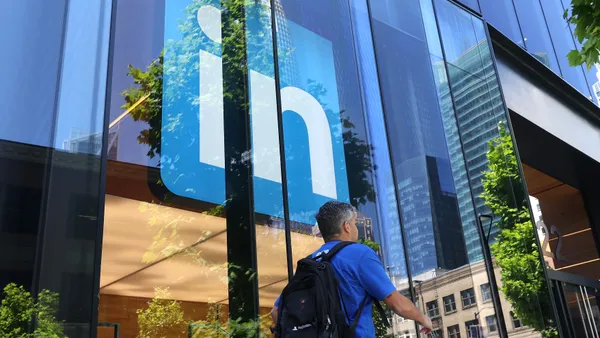Dive Brief:
- Market conditions and worker expectations are driving employers to make addressing pay discrepancies one of their compensation goals, according to a Robert Half survey of 376 C-suite executives. The firm found that 56% of respondents observed pay discrepancies between new hires and more tenured staff in the past year.
- To that end, 62% of respondents said they were regularly reviewing compensation plans and increasing salaries for existing employees to align with current market rates. The findings indicate that employers believe taking a "wait-and-see" approach to pay is a risky proposition in the current market, said Paul McDonald, senior executive director at Robert Half.
- Pressure from employees may be a determining factor for pay strategy. In a separate Robert Half survey of more than 1,000 U.S. workers, 62% said they planned to ask for a raise in 2022, and living costs were a key issue driving this sentiment. Asked what they would do if they did not receive a raise, 31% of workers said they would ask to revisit the conversation "in a few months," while 27% would look for a new job.
Dive Insight:
During one of the most candidate-friendly job markets in recent memory, few HR conversations have been upended in quite the same fashion as pay.
With attrition surging during the Great Resignation, low pay played a role in 63% of U.S. workers' decisions to quit their jobs in 2021, according to a Pew Research Center survey published last month. More than half of those who switched jobs, 56%, said they were earning more money in their new position.
The same theme bore out in other research. A Conference Board survey published in February found that nearly a third of employees who left their organizations during the pandemic went on to make over 30% more in their new roles, while 20% received increases of 10% to 20%. Most respondents in the Conference Board survey said they were concerned about inflation, however, and a recent LinkedIn Hiring Lab report showed that wage growth in some industries, such as retail food services, has slowed.
But respondents to the Robert Half survey may be onto something with plans to address pay discrepancies. While pay increases played a role in recent waves of attrition, a Glassdoor survey found that 63% of female employees said the talent market had given them more leverage to negotiate their pay. Moreover, 63% of all respondents to the Glassdoor survey said they preferred to work at a company that discloses pay information.
Employers also have responded by building more frequent pay increases into their compensation plans, sources previously told HR Dive. Whereas pay traditionally may have been part of an annual review process, short-term incentives can be offered at different points throughout the year.
Others are focusing on what benefits and perks they can offer beyond pay. One increasingly trendy pick is a shortened, 4-day workweek. A recent Qualtrics survey found that 92% of employee respondents said they wanted their employers to adopt a four-day workweek, with 88% saying that doing so would improve their work-life balance and 82% saying that it would make them more productive.











